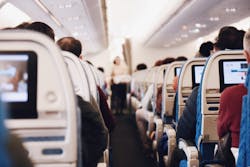Commercial pilots blame pandemic downtime for in-flight mistakes
ATLANTA - The steepest downturn in modern aviation history means plenty of airline pilots are spending weeks or months of the coronavirus pandemic idling at home. When they do return to the cockpit, a few are admitting that they're out of practice, and knocking off the rust is proving harder than anticipated, Gregory Wallace and Pete Muntean report for CNN. Continue reading original article.
The Intelligent Aerospace take:
February 5, 2021 -NASA established its Aviation Safety Reporting System (ASRS) in 1976 as a way for industry professionals to confidentially report incidences so that data can be analyzed and disseminated back to the community.
In recent reports - which are voluntary, confidential, and non-punitive - a number of pilots disclosed a number of incidents that they believe were impacted by a lack of flying hours due to the COVID pandemic.
"This was my first flight in nearly 3 months," one pilot wrote in a June report explaining why he or she neglected to turn on the critical anti-icing system. "I placed too much confidence in assuming that it would all come back to me as 'second nature.'"
Another pilot had a very serious incident in which they landed without permission from air traffic controllers
"Since COVID-19 breakout, I was not flying as frequently as before," that pilot wrote. "I believe this was factored into this incident."
Related: Mitsubishi postpones regional jet program due to COVID-19 disruptions, says GlobalData
Related: COVID dominates headlines in the aerospace sector in 2020
Related: Aircraft orders slump to record low as COVID pandemic and quarantines hit travel
Jamie Whitney, Associate Editor
Intelligent Aerospace
